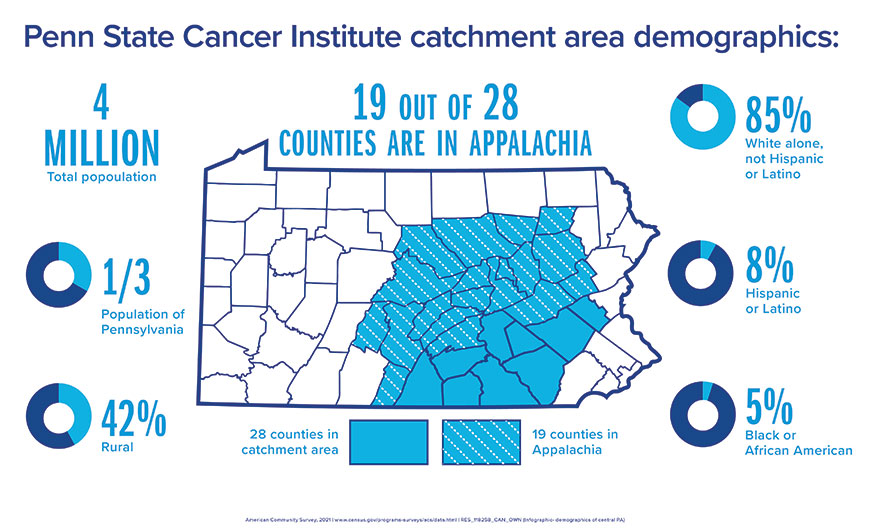Hispanic/Latino Community Cancer Advisory Board (CAB)
Established in 2018, the Hispanic/Latino Community Cancer Advisory Board (CAB) serves as a bridge between the Penn State Cancer Institute (PSCI) and the Hispanic/Latino community in central Pennsylvania. The CAB advises the PSCI on all cancer issues that affect Hispanics/Latinos, reviews cancer-related research protocols, helps recruit study participants, and conducts outreach for cancer prevention and control.
The CAB has been instrumental in research related to collection of social determinants of health data from cancer patients, skin cancer risk perception and behavior among Hispanic/Latinos, colorectal cancer education and cancer screening among Latino men, overscreening for cancer among older adults, breast cancer prevention and screening among Latina women, and a Spanish-language cancer webinar series which has had domestic and international reach.
The CAB is composed of community leaders and organizations from central Pennsylvania. It is co-chaired by a community member and academic member and meets on a quarterly basis. The CAB always welcomes new community leaders with an interest in cancer prevention and control and will advocate for the Hispanic/Latino community in central Pennsylvania. If you would like more information, please contact OCHE@psu.edu.
Cancer Institute staff member advances health equity in central Pennsylvania.
Cancer Navigation and Survivorship Network (CaNSuN)
The Cancer Navigation and Survivorship Network (CaNSuN) is a hub for cancer patient navigation in Pennsylvania. Our mission is to connect, educate, develop and share best practices among patient navigators in Pennsylvania so that together we can successfully reduce barriers and increase access to cancer prevention, screening, treatment and survivorship services. In brief, we want to “help navigators navigate.” CaNSuN:
- Disseminates navigation-related materials and tools
- Shares best practice strategies for identifying and removing barriers to cancer screening and care
- Fosters networking and communication among navigators
- Promotes professional development opportunities
- Identifies and collaborates on research to improve patient outcomes
- Advocates for f navigation within healthcare systems, the community and the Commonwealth.
To accomplish this, we host monthly virtual meetings with state and national leaders and host an annual in-person summit. We also publish a monthly newsletter In 2021, we conducted a statewide environmental scan to better understand the landscape of navigation services in Pennsylvania and strategies best support navigators through network activities.
CaNSuN is advised by a steering committee of navigators, social workers, and community health workers, with representation from the PA Department of Health, American Cancer Society, and leading health systems and cancer centers.
Get Checked PA!: A training program for Community Health Workers (CHWs)
Established in 2022, Get Checked PA! is an evidence-based, multi-component initiative designed to reduce the cancer burden in Pennsylvania through the work of Community Health Workers (CHWs). Get Checked PA! is a train-the-trainer program to support instructors in CHW training programs and CHWs working in the field. A primary component is an interactive curriculum that equips CHWs with the knowledge and competency to improve cancer screening and early detection strategies in their community. Get Checked PA! provides participants with continuing education credits from the PA CHW Certification Board. One participant reported, “I enjoyed the overall content. The detailed information about certain types of cancer was very well explained and illustrated."
Get Checked PA! is developing a mentored, apprenticeship program with health care and community-based organizations who employ one of our graduates for cancer prevention and control.
LionVu
The OCHE has developed LionVu - a free online mapping resource and data portal. LionVu can be used by community members, program managers and researchers to understand the impact of cancer and cancer risk on communities throughout Pennsylvania. LionVu has more than 400 data variables, including social determinants of health, health care access and cancer outcomes.
Precision Cancer Screening Navigation
In 2021, the OCHE initiated ‘precision patient navigation’ as a strategy to support cancer survivorship. Our goal is detection and treatment of cancer at an early stage when treatment is most effective. ‘Precision patient navigation’ extends traditional screening navigation by using quantitative methods to assess a patient’s social determinants of health and clinical history so as to tailor one-on-one screening navigation. Our navigators, who hold master’s degrees in social work, utilize evidence-based strategies such as motivational interviewing and shared decision-making. This tailored approach increases the efficiency and effectiveness of traditional screening navigation. Working closely with Penn State Health, 200 women were offered ‘precision patient navigation’ for breast cancer during 2022-23.

